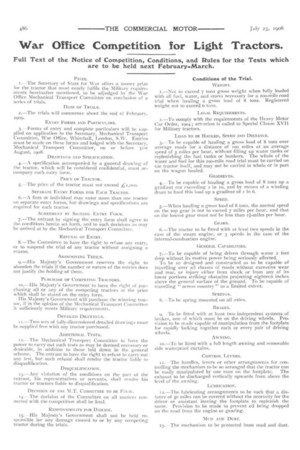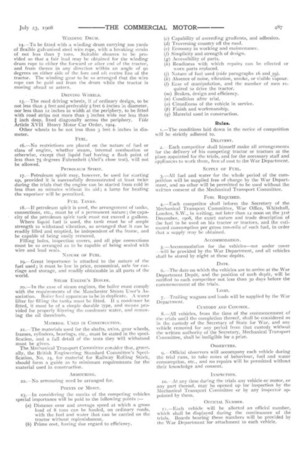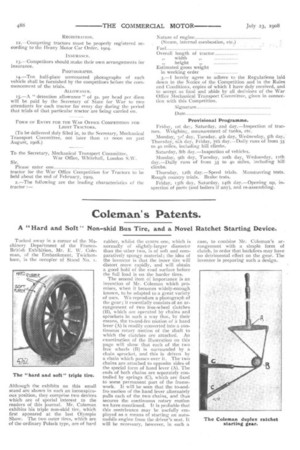War Office Competition for Light Tractors.
Page 2

Page 3

Page 4

If you've noticed an error in this article please click here to report it so we can fix it.
Full Text of the Notice of Competition, Conditions, and Rules for the Tests which are to be held next February-March.
PRIZE.
I.—The Secretary of State for War offers a money prize for the tractor that most nearly fulfils the Military requirements hereinafter mentioned, to be adjudged by the War Office. Mechanical Transport Committee on Conclusion of a series of trials.
DATE OF TRIALS.
2.—The trials will commence about the end of February, 1909.
ENTRY FORMS AND PARTICULARS.
3.—Forms of entry and complete particulars will be supplied on application to the Secretary, Mechanical Transport Committee, War Office, Whitehall, London, S.W. Entries must be made on these forms and lodged with the Secretary, Mechanical Transport Committee, on or before 31st August, 1908.
DRAWINGS AND SPECIFICATION.
4.—A specification accompanied by a general drawing of the tractor, which will be considered confidential, must accompany each entry form.
PRICE OF TRACTOR.
5.—The price of the tractor must not exceed ;i,000.
SEPARATE ENTRY FORMS FOR EACH TRACTOR.
• 6.—A firm or individual may enter more than one tractor on separate entry forms, but drawings and specifications are required for each tractor.
AGREEMENT BY SIGNING ENTRY FORM-.
7.—The entrant by signing the entry form shall agree to the conditions herein set forth, and to such decisions as may be arrived at by the Mechanical Transport Committee.
REFUSAL OF ENTRY.
8.—The Committee to have the right to refuse any entry, or to suspend the trial of any tractor without assigning a reason.
ABANDONING TRIALS.
9.—His Majesty's Government reserves the right to abandon the trials if the number or nature of the entries does not justify the holding of them.
PURCHASE OF COMPETING TRACTORS, 10.—HIS Majesty's Government to have the right of purchasing all or any of the competing tractors at the price which shall be stated on the entry form. His Majesty's Government will purchase the winning tractor, if in the opinion of the Mechanical Transport Committee it sufficiently meets Military requirements.
DETAILED DRAWINGS.
11.—Two sets of fully-dimensioned detailed drawings must be supplied free with any tractor purchased.
ADDITIONAL TESTS.
T2.—The Mechanical Transport Committee to have the power to carry out such tests as may be deemed necessary or desirable, in addition to those laid down in the general scheme. The entrant to have the right to refuse to carry out any test, but such refusal shall render the tractor liable to disqualification.
DISQUALIFICATION.
I3.—Any violation of the conditions on the part of the entrant, his representatives or servants, shall render his tractor or tractorshable to disqualification.
DECISION OF THE M.T. COMMITTEE TO BE FINAL.
14.—The decision of the Committee On all matters connected with the competition shall be final.
RESPONSIBILITY FOR DAMAGE.
IS.—His Majesty's Government shall not be held responsible for any damage caused to or by any competing tractor during the trials. Conditions of the Trial.
WEIGHT.
T.—Not to exceed 7 tons gross weight when fully loaded with all fuel, water, and stores necessary for a too-mile road trial when hauling a gross load of 8 tons. Registered weight not to exceed 6 tons.
LEGAL REQUIREMENTS.
2.—To comply with the requirements of the Heavy Motor Car Order, '904; attention is called to Special Clause XVII. for Military tractors.
LOAD TO BE HAULED, SPEED AND DISTANCE.
3.—To be capable of hauling a gross load of 8 tons over average roads for a distance of moo miles at an average speed of 5 mil•es per hour, without filling up water tanks or replenishing the fuel tanks or bunkers. The whole of the water and fuel for this too-mile road trial must be carried on the tractor itself, and may not be carried in whole or in part on the wagon hauled.
GRADIENTS.
4.-To be capable of hauling a gross load of 8 tons up a gradient not exceeding i in to, and by means of a winding drum to haul this load up a gradient of i in 6.
SPEED.
5.—When hauling a gross load of 8 tons, the normal speed on the top gear is not to exceed 7 miles per hour, and that on the lowest gear must not be less than q-miles per hour.
GEARS.
6.—The tractor to be fitted with at least two speeds in the case of the steam engine, or 3 speeds in the case of the internal-combustion engine.
GENERAL CAPABILITIES.
7.—To be capable of being driven through water 2 feet deep without its motive power being seriously affected. To be so designed and constructed as to be capable of travelling over all classes of roads without excessive wear and tear, or injury either from shock or from any of its lower portions striking obstacles projecting eighteen inches above the general surface of the ground. To be capable of travelling " across country " to a limited extent.
SPRINGS.
8.—To be spring mounted on all axles.
BRAKES.
9. –To be fitted with at least two independent systems of brakes, one of which must be on the driving. wheels. Pro-vision to be made capable of manipulation from the footplate for rapidly locking together each or every pair of driving wheels.
AWNING.
ID.—To be fitted with a full length awning and removable side waterproof curtains.
CONTROL LEVERS.
II. The handles, levers or other arrangements for controlling the mechanism to be so arranged that the tractor can be easily manipulated by one man on the footplate. The exhaust to be discharged vertically upwards from above the level of the awning-.
LUBRICATION.
12.—The lubricating arrangements to be such that a distance of 5o miles can be covered without the necessity for the driver or assistant leaving the footplate to replenish the same. Provision to be made to prevent oil being dropped on the road from the engine or gearing.
MUD AND DUST.
I3.—The mechanism to be protected from mud and dust.
WINDING DRUM.
4.—To be fitted with a winding drum carrying too yards of flexible galvanised steel wire rope, with a breaking strain of not less than 7 tons. Suitable sheaves to be provided so that a fair lead may be obtained for the winding drum rope to either the forward or after end of the tractor, and from thence in any direction within an angle of go degrees on either side of the fore and aft centre line of the tractor. The winding gear to be so arranged that the wire rope can be paid out from the drum while the tractor is moving ahead or astern.
DRIVING WHEELS,
15.—The road driving wheels, if of ordinary design, to be not less than 5 feet and preferably 5 feet 6 inches in diameter, nor less than 12 inches in width at the periphery, to be fitted with road strips not more than 3 inches wide nor less than f inch deep, fixed diagonally across the periphery. Vide Article XVII Heavy Motor Car Order, I 9134.
Other wheels to be not less than 3 feet 6 inches in diameter.
FUEL.
lb.—No restrictions are placed on the nature of fuel or class of engine, whether steam, internal combustion or otherwise, except that liquid fuel having a flash point of less than 75 degrees Fahrenheit (Abel's close test), will not be allowed.
PterRot.a.tem SPII2 IT.
I 7. —Petroleum spirit may, however, be used for starting up, provided it is successfully demonstrated at least twice during the trials that the engine can be started from cold in less than 20 minutes without its aid ; a lamp for heating the vaporiser will be permitted.
FUEL TANKS.
t8.—If petroleum spirit is used, the arrangement of tanks, connections, etc., must be of a permanent nature ; the capacity of the petroleum spirit tank must not exceed 2 gallons. Where liquid fuel is used, the tank must be of ample strength to withstand vibration, so arranged that it can be readily filled and emptied, be independent of the frame, and he capable of being easily removed.
Filling holes, inspection covers, and all pipe connections must be so arranged as to be capable of being sealed with wire and lead seals.
NATURE OF FUEL.
to.—Great importance is attached to the nature of the fuel used ; it must be low in price, economical, safe for carriage and storage, and readily obtainable in all parts of the world.
STEAM ENGINE'S BOILF.R.
20. —Tn the ease of steam engines, the boiler must comply with the requirements of the Manchester Steam User's Association. Boiler feed apparatus to be in duplicate. A water lifter for filling the tanks must be fitted. If a condenser be fitted, it must be of a simple durable type, and means provided for properly filtering the condenser water, and removing the oil therefrom.
MATERIAL USED IN CONSTRUCTION.
2 I . —The materials used for the shafts, axles, gear wheels, frames, cylinders, bearings, etc., must be stated in the specification, and a full detail of the tests they will withstand must be given.
The Mechanical Transport Committee consider that, generally, the British Engineering Standard Committee's Specification, No. 24, for material for Railway Rolling Stock, should form a guide as to minimum requirements for the material used in construction.
ARMOURING.
22. —No armouring need be arranged for.
POINTS OF MERIT.
23.—In considering the merits of the competing vehicles special importance will be paid to the following points : (a) Distance over and average speed at which a gross load of 8 tons can be hauled, on ordinary roads, with the fuel and water that can be carried on the tractor without replenishment.
(b) Prime cost, having due regard to efficiency. (c) Capability of ascending gradients, and adhesion.
(d) Traversing country off the road.
(e) Economy in working and maintenance. (j) Simplicity and strength of design.
(g) Accessibility of parts.
(h) Readiness with which repairs can be effected or worn parts replaced.
(j) Nature of fuel used (vide paragraphs 16 and).
(k) Absence of noise, vibration, smoke, or visible vapour. (1) Ease of manipulation, and the number of men required to drive the tractor.
(m) Brakes, design and efficiency.
(n) Condition after trial.
(o) Cleanliness of the vehicle in service. (p) Finish and workmanship.
(q) Material used in construction.
Rules.
t.—The conditions laid down in the notice of competition will be strictly adhered to.
DELIVERY.
2.Each competitor shall himself make all arrangements for the delivery of his competing tractor or tractors at the place appointed for the trials, and for the necessary staff and appliances to work them, free of cost to the War Department.
SUPPLY or FUEL.
3.—All fuel and water for the whole period of the competition will be supplied free of charge by the War Department, and no other will be permitted to be used without the written consent of the Mechanical Transport Committee.
FUF.I. REQUIRED.
4.—Each competitor shall inform the Secretary of the Mechanical Transport Committee, War Office, Whitehall, London, S.W., in writing, not later than 12 noon on the 3ist December, 19o8, the exact nature and trade description of the fuel to be used on his tractor or tractors, and the estimated consumption per gross ton-mile of such fuel, in order that a supply may be obtained.
ACCOMMODATION.
--k
S. ccommodation for the vehicles—not under cover —will be provided by the War Department, and all vehicles shall be stored by night at these depots.
DATE.
6.—The date on which the vehicles are to arrive at the War Department Depot, and the position of such &LAI, will be notified to each competitor not less than 30 days before the commencement of the trials.
MAD.
7.• -Trailing wagons and loads will be supplied by the War Department.
CUSTODY AND CONTROL.
8.—All vehicles, from the time of the commencement of the trials until the completion thereof, shall be considered as in the custody of the Secretary of State for War, and any vehicle removed for any period from that custody without the written authority of the Secretary, Mechanical Transport Committee, shall be ineligible for a prize.
OBSERVERS.
g.—Official observers will accompany each vehicle during the trial runs, to take notes of behaviour, fuel and water consumption, etc., and no repairs will be permitted without their knowledge and consent.
INSPECTION.
O. —At any time during the trials any vehicle or motor, or any part thereof, may be opened up for inspection by -the Mechanical Transport Committee or by any inspector appointed by them.
OFFICIAL NUMBER.
tt.—Each vehicle will be allotted an official number, which shall be displayed during the continuance of the trials. Boards bearing these numbers will be provided by the War. Department for attachment to each vehicle.
REGISTRATION.
12. —Competing tractors must be properly registered according to the Heavy Motor Car Order, 19o4.
I NSURANCE.
13.—Competitors should make their own arrangements for insurance.
PHOTOGRAPHS.
14. —Ten half-plate unmounted photographs of each vehicle shall be furnished by the competitors before the commencement of the trials.
ALLOWANCE.
detention allowance " of 5s. per head per diem will be paid by the Secretary of State for War to two attendants for each tractor for every day during the period that trials of that particular tractor are being carried on.
FORM OF ENTRY FOR THE WAR OFFICE COMPETITION FOR LIGHT TRACTORS.
(To be delivered duly filled in, to the Secretary, Mechanical Transport Committee, not later than 12 noon on 3ist August, 1908.)
To the Secretary, Mechanical Transport Committee, War Office, Whitehall, London S.W. Sir, Please enter one tractor for the War Office Competition for Tractors to be held about the end of February, 1909.
2.—The following are the leading characteristics of the tractor :— Nature of engine (Steam, internal combustion etc.) Fuel Overall length of tractor width „ height Estimated gross weight in working order
3.—I hereby agree to adhere to the Regulations laid down in the Notice of the Competition and in the Rules and Conditions, copies of which I have duly received, and to accept as final and abide by all decisions of the War Office Mechanical Transport Committee, given in connection with this Competition.
Signature Date Provisional Programme.
Friday, _1st da-i, Saturday, znd day.—Inspection of tractors. Weighing, measurement of tanks, etc.
Monday, day, Tuesday, 4th day, Wednesday, 5th day,' Thursday, 6th day, Friday, 7th day.—Daily runs of from 35 to 40 miles, including hill climbs.
Saturday, 8th day.—Inspection of vehicles.
Monday, gth day, Tuesday, loth day, Wednesday, iith day.--Daily runs of from 35 to 40 miles, including hilt Thursday, 12th day.—Speed trials. Manceuvring tests. Rough country trials. Brake tests.
Friday, t3th day, Saturday, Lith day.—Opening up, inspection of parts (and boilers if any), and re-assembling.




















